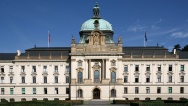Press Advisories
1. 6. 2009 15:15
Policy Statement from the Government of the Czech Republic
Preamble
The Czech government appointed by the President on 8th May 2009 came into being on the basis of an agreement between three political parties: ODS, ČSSD and the Greens. In contrast to normal political governments it is not formed from a coalition of political parties, but is made up of non-party specialists and does not depend in Parliament on a political clearly defined coalition majority. Its aim therefore is not to implement a political programme, but to manage the country in a high-quality, impartial and, as far as possible, politically neutral manner up to the early parliamentary elections. The members of the government are aware of this fact and and respect the fact that the government's mandate is limited by the majority will of Chamber of Deputies to reach parliamentary elections in October 2009 and not to take any fundamental political decisions. The government therefore declares openly that during its period in office it will not open for discussion topics which are politically sensitive or loaded, or more precisely, will not submit to the Chamber of Deputies legislative proposals of a politically or ideologically motivated nature. The government is committed to the idea of a technocratic government, in the positive meaning of this, with the aim of bridging the gap up to the establishment of a political government.
While being aware of this limited definition of its mandate, the government at the same time declares its commitment to meeting its obligations under the Constitution of the Czech Republic. The government is not only prepared to continue responsibly in its administration of the country, but also to manage the complex tasks arising from our Presidency of the Council of Europe, and above all to conscientiously seek out ways of minimalising the impact of the global economic crisis on the Czech economy. Equally, the government declares its readiness to enter into dialogue and cooperation with the Chamber of Deputies, across the political spectrum.
In this Policy Statement the government defines in brief the basic starting points for its activities and the priorities and issue areas which it regards as important.
Basic starting points
The government will base its work on the basic interests of the Czech Republic, which include the strengthening of democracy and the legal system, the development of a modern and socially sensitive market economy and active involvement in European and Euro-Atlantic structures. The government is not taking up its responsibilities at an easy time, when the Czech Republic is affected by the global economic crisis and when, as a result of political instability, it does not enjoy a programme majority in the Chamber of Deputies. After several years of economic growth and a rapid rise in the population's living standards, more frugal years now await us. For this reason also our country must look at the situation realistically and without ideological adornments.
The global economic crisis, and more particularly the fall in foreign demand which we are currently witnessing, already has - and will continue to have - an enormous impact, seen particularly from the state's point of view in a steep fall in state revenues. The overall decrease in economic activity results in a reduction in VAT, an increase in unemployment and stagnation in incomes. This year's budget will go into significant deficit, which will - inter alia - generate large costs in the area of debt servicing. Here the position really is serious!
But we have also have cause for relative optimism, the current low rate of inflation, the fact that the balance of payments is being held within acceptable limits and that foreign currency indebtedness is almost negligible. One important fact is that the domestic banking sector was not directly affected by the financial crisis and is in good condition. And so even if the situation is serious, we are certainly not threatened by a collapse in the country's economic stability and the government would like to assure everyone that it will not allow such a thing to happen.
The government is aware of the fact that in addition to the economy and the global crisis, currently playing an important role in Czech society, it must also deal with other problems. In this regard the most important of these is the preservation of social peace. At a time of economic decline this will be exceptionally difficult. In this area the government is therefore ready to work not only with the politicial parties in the Chamber of Deputies, but also with trade unions and employers, with professional and interest groups and to conduct dialogue with the appropriate civic associations, churches and religious organisations. In short, and aware of the fact that it will have to prepare and implement some unpopular steps, with minimum scope for meeting people's financial requirements in particular, the government wishes to act as a unifying, and not divisive, force in Czech society.
And finally, the government is aware that in the short time remaining it cannot resolve the country's underlying problems. But at the same time it does not wish to give up on technical solutions to problems such as pensions and health reform, or the issue of completing the recodification of private law. Therefore it will arrange for work to continue at the specialist and analytical level within individual ministries, so that the government elected at the parliamentary elections can work with various options. However in its own legislative activities the government will be relatively limited. Apart from the Act on the State Budget for 2010, it will submit to Parliament only drafts of a technical nature, or those which enjoy crossbench support and where there is therefore reason to believe that they will be accepted during the current period of office of the Chamber of Deputies.
In the light of these circumstances the government has set for itself the following priorities :
I. A dignified and professional end to the Czech Presidency of the EU Council
II. Implementation of steps to revive a domestic economy affected by the global economic crisis and against rising unemployment.
III. Preparation of a realistic and professionally prepared budget for 2010
IV. Continuation of those projects (including legislative projects) which were prepared by the previous government and which enjoy majority support in the Chamber of Deputies
V. Improved and more rapid drawdown of EU funds.
Programme Objectives
From the viewpoint of areas in the government's purview, individual ministries have in particular the following objectives:
Foreign Policy and the European Union
The government's objective is a responsible foreign policy founded on the widest possible domestic political consensus. In particular the government will put maximum effort into the termination of the Czech Presidency of the European Union Council. The Czech Republic presides over the European Union as a country and the government therefore considers a successful termination of the Czech Presidency as a joint task for all state agencies. The government will build naturally on the presidency programme and priorities prepared by the previous government. It will focus its primary attention on the final June meeting of the European Council. Following the end of our Presidency the government will then conduct a comprehensive review of experience from the Presidency, including the use of human resources, which will be used to the maximum in promoting Czech interests within the European Union.
Following the end of the Czech Presidency the government will try to further develop initiatives which were begun under the Czech Presidency. The government will build on long-term aspects of Czech European Union policy, and in particular on the Czech Republic's active support for further expansion of the European Union. The government will also support a more active role for the European Union internationally.
The government will focus foreign policy on the cultivation of good relations with our neighbours, strengthening of the transatlantic connection, support for good and efficient functioning of international organisations, on cooperation with developing countries, and the fight against climate change, the protection of human rights and the strengthening of democracy throughout the world, on economic diplomacy and the protection of Czech citizens abroad. The government's foreign policy will be both active and realistic. It will be concerned with the good name of the Czech Republic throughout the world. The Czech Republic will be both a reliable partner and a loyal ally. It will honour its existing commitments. In foreign policy the government will act in unison. The government will conduct consultations on all fundamental topics of foreign policy with both Chambers of the Czech Parliament and also with the President of the Republic. And finally at the legislative level the government will continue to prepare a draft Act on foreign development cooperation and humanitarian aid.
Economic and Budget Policy
The government will without delay take steps to reduce government expenditure for 2009 with the objective of keeping the deficit this year to under 5% of GDP according to the ESA 95 methodology. The anti-crisis expenditure measures which have already been taken will be aimed mainly at those areas of government expenditure with the greatest multiplier effect. A further key task for the government will be the establishment of a state budget for 2010 with a deficit which does not exceed 170 bn CZK, that is approx. 5% of GDP.
The government will continue to prepare the privatisation of companies which do not provide public services, among other reasons for the expected benefit for government finances. Of course the government is ready to defer the final decision on privatisation and leave it to the government which will be elected at the early elections.
The government considers it important to finish the legislative process for drafts submitted to the Czech Parliament in the area of anti-crisis measures, the financial markets and price regulation.
In the area of industrial policy the government wishes to pay particular attention to the country's energy security and the maintenance of a safe limit on energy import dependence. It will support the effective use of energy resources and the development of zero-emission technologies. The government also wishes to emphasise the retention of systems for the centralised supply of heat, as well as the development of energy systems to limit exceptional situations in energy supply.
The government will attempt to lessen the negative impact of the economic crisis on small- and medium-sized firms, by improving, for example, access to sources of finance. At the same time the government will continue to implement the Plan for Lowering the Administrative Burden on Businesses. As part of the Operational Programme for Business and Innovation approved for 2007 - 2013, the government will secure the maximum use of European funds with the accent on support for small- and medium-sized businesses.
Defence, Internal Security, Public Administration and Justice
The aims and tasks of the Armed Forces of the Czech Republic will be set by the government with regard to the strategic priorities of NATO and European security and defence policy. The government will continue the process of reforming the armed forces with the consistent application of the principle of civil management and securing the maximum effective use of committed funds. In line with the Czech Republic's strategic documents for defence and security, with its obligations arising from membership of international organisations and the Czech Republic's abilities, the government will prepare a proposal for the use of the forces and resources of the Ministry of Defence in overseas operations in 2010.
The government considers the greatest threats to internal security to be organised crime, terrorism, drug-related criminality and the growth of extremism. For this reason the government will continually assess and update on an ongoing basis measures for these kinds of criminal activity. The government considers as being of particularly currency an uncompromising stance on all forms of extremism and the consistent pursuit of any attempts to break the law on the part of followers of anti-democratic ideologies, and the government will therefore again assess the option of proposing a ban on certain extremist political groups.
The government will monitor on an ongoing basis the impact of the economic crisis on migration and will take appropriate measures. It will complete the preparation of the Act on State Citizenship of the Czech Republic, which will better reflect our membership of the European Union.
The government will continue with the projects for electronic public administration, particularly with the process of introducing data mailboxes which will permit simpler, easier and cheaper delivery of documents. The government will also continue with the establishment of basic public administration registers and will also support the project for universal contact points for public administration (Czech POINT). It will at the same time emphasise the maximum use of European Union funds for the integrated operational programme in order to finance the electronic public administration project.
In the area of justice the government's aim is to calm the situation in Czech justice and to consistently respect its independence. In the legislative area the government will attempt to complete parliamentary debate on drafts which have already been presented, in particular amendments to the Civil Procedure Code, the Act on Advocacy, the Commercial Code and others. The government will also continue with legislative work which has already started, for example on the reform of court fees, the new Criminal Code and the planned reform of the Public Attorney's Office.
Social Affairs and Health
With regard to the current economic conditions the government will monitor citizens' social situation and will take measures on an operational basis to prevent a fall in incomes. The government will take a decision on the indexed increased in state pensions from January 2010 and will take short- and long-term measures to soften the impact of the economic crisis on employment, the elderly, the handicapped and families with children.
The government will support employees' and employers' adaptation to the altered conditions of the labour market and will continue to use European Union structural funds to deal with the consequences of the unfavourable economic situation, particularly in support of an active employment policy. The government will devote increased attention to the implementation of the recently adopted Acts on health insurance and social services. In cooperation with local authority representatives and other relevant players it will begin work on analysing the effectiveness of social services.
In the health service the government will not implement any fundamental changes in the system of health care or health insurance. Its priority will be to achieve political agreement on the steps essential to minimalising the impact of the financial crisis on the scope of health care offered and on the system of health insurance. The government will continue projects for monitoring the quality and performance of health care and will continue its work on creating a set of National Standards for Specialist Health Care.
In the health care system also, the government considers it particularly important to successfully draw down funds from the European Union, with priority investment going into the modernisation of health care facilities, the financing of postgraduate education, the standardisation of specialist health care and the prevention of health risks.
Agriculture, the Environment, Transport and the Regions
In regional policy the government will strive to strengthen relations with the regional governors, local authorities and with the relevant professional associations. In particular it will attempt to speed up the drawing down of European Union funds, with finances being prioritised into projects which will soften the impact of the financial crisis. In this connection the government considers it important to solve quickly the problem of the monitoring system.
In agriculture the government will look for, through the programmes of the Support Guarantee Fund for Agriculture and Forestry, instruments to soften the negative impact of the current economic crisis in the food and agriculture sector. Within the possibilities offered by the European Union Common Agricultural Policy, it will strive for maximum use of available financial resources, especially the use of financial resources from the European Package for Economic Renewal. The government will support improved competitiveness in agriculture and in the food and processing industries with the aim of securing the production of high-quality and safe food, while at the same time respecting consumers' interests. Its aim is to continue and further develop a sustainable strategy for countryside development on the principle of a balance between economic, ecological and social approaches and to continue to support ecological agriculture and the development of organic food production.
For the environment, the government will support international negotiations on a new agreement on climate protection, so that it can be adopted in Copenhagen in December 2009. It will also attempt to develop environmentally friendly technologies with the aim of improving the environment and stimulating the Czech economy during the crisis, for example in the shape of the Green Light for Savings programme and the Operational Programme for the Environment. The government also intends to support the growth of energy savings and renewable energy sources and to reduce energy use in public administration by taking account of energy efficiencies when announcing public tenders. The government also plans to take the necessary steps for Czech Republic membership of the International Renewable Energy Agency (IRENA). In accordance with European legislation the government will support improved waste recycling and restrictions on tipping and biowaste. The government will protect nature and the countryside in a responsible manner, using the latest scientific information.
In transport the government's aim is to secure finances for tranport infrastructure projects, specifically for key transport construction projects in 2009 which have already been started and then also in the draft budget for 2010. The government considers as fundamental priorities for transport infrastructure construction the need to link the Czech Republic into European transport networks, support for the development of business and transport services in the Czech Republic and minimising negative impacts on the environment.
The government will continue to prepare a hybrid system for collecting road tolls and will work on preparing the conditions for extending electronic tolls to vehicles over 3.5 tonnes and will also look at the possibility of using differential toll rates, especially time-based. Support will also be provided for the development of intelligent transport systems to improve the safety and flow of road traffic. The government will continue the liberalisation and improvements in efficiency of the railway system and the restructuring of Czech Railways. In this connection it will emphasise further development of European Union relations with neighbouring countries and projects for energy security, support for the European GALILEO project and will continue to try to have the HQ of the GALILEO regulatory agency located in the Czech Republic.
Education, Science, Research, Culture and Human Rights
The government considers education, science and research as one of the key areas for the improvement of competitiveness and will try to ensure that the planned cuts in budget spending do not affect this area. In this connection the government will prepare an analysis of the current funding system for the education system. The government will continue the reform of universities. The government will strive to strengthen the capacity to absorb European Union funds of small schools, educational institutions and other applicants and to improve the selection of projects and to simplify implementation processes. It will complete the draft reform of the Research, Development and Innovation System, including a proposal for new instruments to finance and support large research infrastructures. The government will also carefully monitor the drawdown of funds from the Operational Programme: Research and Development for Innovations.
The government will continue to prepare a unified common base for school leaving examinations (the "state school leaving examination"). It will develop further projects aimed at supporting teachers and impartial access to education. The government will support the development of sport, and in particular talented young people and national sports teams, and will continue to create conditions for volunteer activities in the sporting arena. The government will support cultural, education and research projects aimed at developing citizens' creativity. The government will present for public debate proposals for further conceptual materials aimed at supporting areas of culture which have significant economic influence - Czech cinematography and the film industry, care of monuments, cultural heritage and digitalisation of cultural items. In view of the economic situation the government will seek out options for microbudget funds to support the creation and preservation of cultural assets and will arrange for the most efficient possible drawdown of EU funds. From its budget the Ministry of Culture will support projects that have high added value and multiplier effects.
The government's aim in the area of human rights is the effective protection of fundamental rights and freedoms in practice. The government emphasises the protection of children's rights and will start a debate on the options for its further implementation at the institutional level, including securing the maximum cooperation of those institutions which already deal with this. The government will actively promote equal opportunities for women and men and will begin work on preparing a new National Plan for the Support and Integration of the Handicapped for the 2010-2014 period. The government acknowledges the importance of the non-profit sector for the functioning of a democratic society. The government will prepare a strategy for the fight against social exclusion and other socio-pathological phenomena. It will also continue in its work on legislative incorporation of the Agency for Social Integration in Roma Localities. The government will systematically support towns and villages in dealing with the issue of social excluded localities.
Ladies and Gentlemen, members of the Chamber of Deputies!
On behalf of the government which today requests your vote of confidence, I offer you guarantees that the government and I will do everything in our power to fulfil our duties.
I thank you for your attention.






